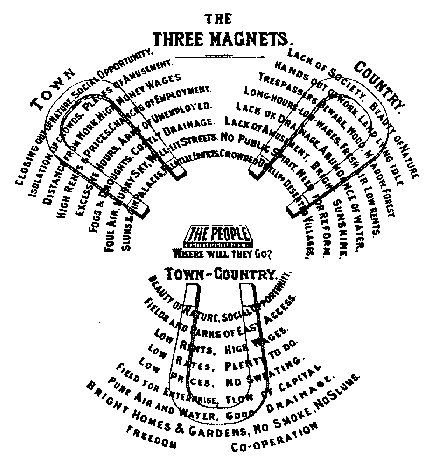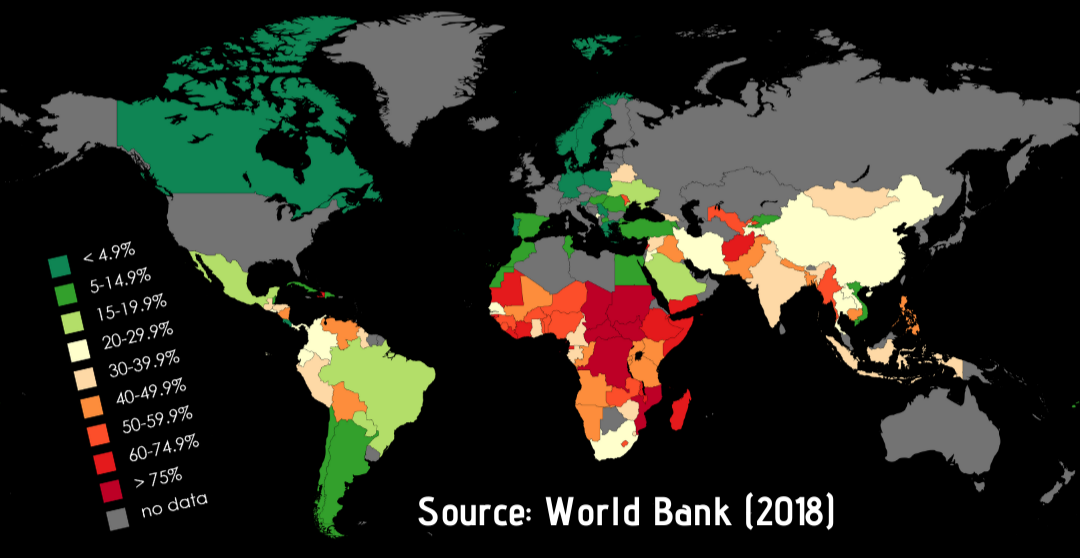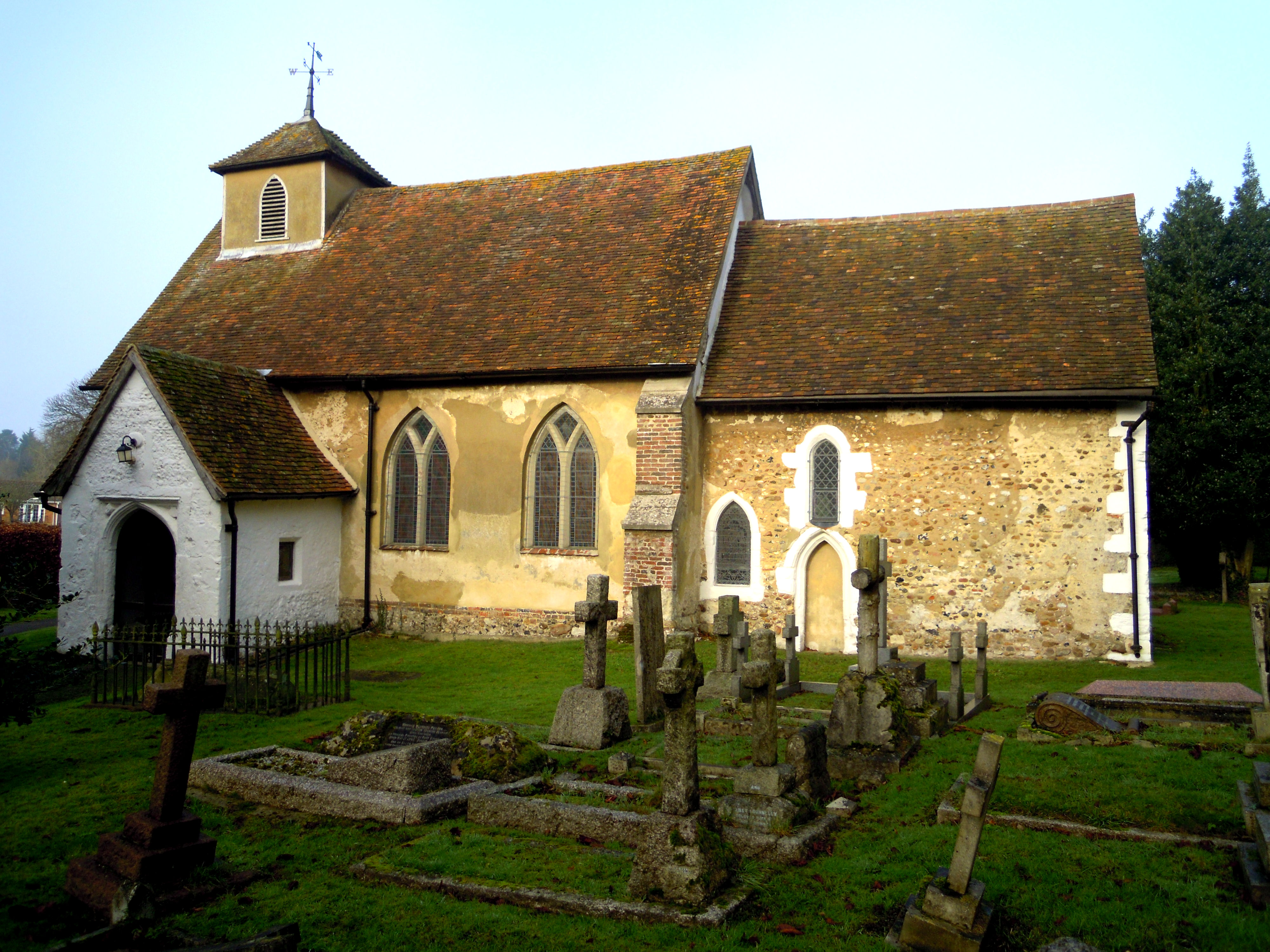|
Garden Cities Of To-morrow
''Garden Cities of To-morrow'' is a book by the British urban planner Ebenezer Howard. When it was published in 1898, the book was titled ''To-morrow: A Peaceful Path to Real Reform''. In 1902 it was reprinted as ''Garden Cities of To-Morrow''. The book gave rise to the garden city movement and is very important in the field of urban design.Anderson, p. 173. Background This book offered a vision of towns free of slums and enjoying the benefits of both town (such as opportunity, amusement and high wages) and country (such as beauty, fresh air and low rents). Howard illustrated the idea with his "Three Magnets" diagram. His ideas were conceived for the context of a capitalist economic system, and sought to balance individual and community needs.Sacred-texts.com. Introduction to ''Garden Cities of Tomorrow''. Visited October 20, 2009. Two English towns were built as garden cities, Letchworth and Welwyn. Though they did not completely measure up to the ideal, they provided a mode ... [...More Info...] [...Related Items...] OR: [Wikipedia] [Google] [Baidu] |
Ebenezer Howard
Sir Ebenezer Howard (29 January 1850 – 1 May 1928) was an English urban planner and founder of the garden city movement, known for his publication '' To-Morrow: A Peaceful Path to Real Reform'' (1898), the description of a utopian city in which people live harmoniously together with nature. The publication resulted in the founding of the garden city movement, and the building of the first garden city, Letchworth Garden City, commenced in 1903. The second true Garden City was Welwyn Garden City (1920) and the movement influenced the development of several model suburbs in other countries, such as Forest Hills Gardens designed by F. L. Olmsted Jr. in 1909, Radburn NJ (1923), Pinelands, Cape Town and the Suburban Resettlement Program towns of the 1930s (Greenbelt, Maryland; Greenhills, Ohio; Greenbrook, New Jersey and Greendale, Wisconsin). Howard aimed to reduce the alienation of humans and society from nature, and hence advocated garden citiesClark, B 2003'Ebenezer Howard a ... [...More Info...] [...Related Items...] OR: [Wikipedia] [Google] [Baidu] |
Swan Sonnenschein & Co
Swans are birds of the family Anatidae within the genus ''Cygnus''. The swans' closest relatives include the geese and ducks. Swans are grouped with the closely related geese in the subfamily Anserinae where they form the tribe Cygnini. Sometimes, they are considered a distinct subfamily, Cygninae. There are six living and many extinct species of swan; in addition, there is a species known as the coscoroba swan which is no longer considered one of the true swans. Swans usually mate for life, although "divorce" sometimes occurs, particularly following nesting failure, and if a mate dies, the remaining swan will take up with another. The number of eggs in each clutch ranges from three to eight. Etymology and terminology The English word ''swan'', akin to the German , Dutch and Swedish , is derived from Indo-European root ' ('to sound, to sing'). Young swans are known as '' cygnets'' or as '' swanlings''; the former derives via Old French or (diminutive suffix et 'little') ... [...More Info...] [...Related Items...] OR: [Wikipedia] [Google] [Baidu] |
Garden City Movement
The garden city movement was a 20th century urban planning movement promoting satellite communities surrounding the central city and separated with greenbelts. These Garden Cities would contain proportionate areas of residences, industry, and agriculture. Ebenezer Howard first posited the idea in 1898 as a way to capture the primary benefits of the countryside and the city while avoiding the disadvantages presented by both. In the early 20th century, Letchworth, Brentham Garden Suburb and Welwyn Garden City were built in or near London according to Howard's concept and many other garden cities inspired by his model have since been built all over the world. History Conception Inspired by the utopian novel ''Looking Backward'' and Henry George's work ''Progress and Poverty'', Howard published the book '': a Peaceful Path to Real Reform'' in 1898 (which was reissued in 1902 as ''Garden Cities of To-morrow''). His idealised garden city would house 32,000 people on a site of , pl ... [...More Info...] [...Related Items...] OR: [Wikipedia] [Google] [Baidu] |
Slum
A slum is a highly populated urban residential area consisting of densely packed housing units of weak build quality and often associated with poverty. The infrastructure in slums is often deteriorated or incomplete, and they are primarily inhabited by impoverished people.What are slums and why do they exist? UN-Habitat, Kenya (April 2007) Although slums are usually located in s, in some countries they can be located in suburban areas where housing quality is low and living conditions are poor. While slums differ in size and other characteristics, most lack r ... [...More Info...] [...Related Items...] OR: [Wikipedia] [Google] [Baidu] |
Renting
Renting, also known as hiring or letting, is an agreement where a payment is made for the temporary use of a good, service or property owned by another. A gross lease is when the tenant pays a flat rental amount and the landlord pays for all property charges regularly incurred by the ownership. An example of renting is equipment rental. Renting can be an example of the sharing economy. History Various types of rent are referenced in Roman law: rent (''canon'') under the long leasehold tenure of Emphyteusis; rent (''reditus'') of a farm; ground-rent (''solarium''); rent of state lands (''vectigal''); and the annual rent (''prensio'') payable for the ''jus superficiarum'' or right to the perpetual enjoyment of anything built on the surface of land. Reasons for renting There are many possible reasons for renting instead of buying, for example: *In many jurisdictions (including India, Spain, Australia, United Kingdom and the United States) rent paid in a trade or business is ... [...More Info...] [...Related Items...] OR: [Wikipedia] [Google] [Baidu] |
Capitalist
Capitalism is an economic system based on the private ownership of the means of production and their operation for profit. Central characteristics of capitalism include capital accumulation, competitive markets, price system, private property, property rights recognition, voluntary exchange, and wage labor. In a market economy, decision-making and investments are determined by owners of wealth, property, or ability to maneuver capital or production ability in capital and financial markets—whereas prices and the distribution of goods and services are mainly determined by competition in goods and services markets. Economists, historians, political economists and sociologists have adopted different perspectives in their analyses of capitalism and have recognized various forms of it in practice. These include ''laissez-faire'' or free-market capitalism, anarcho-capitalism, state capitalism and welfare capitalism. Different forms of capitalism feature varying deg ... [...More Info...] [...Related Items...] OR: [Wikipedia] [Google] [Baidu] |
Economic System
An economic system, or economic order, is a system of Production (economics), production, resource allocation and Distribution (economics), distribution of goods and services within a society or a given geographic area. It includes the combination of the various institutions, agencies, entities, decision-making processes, and patterns of Consumer, consumption that comprise the economic structure of a given community. An economic system is a type of social system. The mode of production is a related concept. All economic systems must confront and solve the four fundamental economic problems: * What kinds and quantities of goods shall be produced: This fundamental economic problem is anchored on the theory of pricing. The theory of pricing, in this context, has to do with the economic decision-making between the production of capital goods and consumer goods in the economy in the face of scarce resources. In this regard, the critical evaluation of the needs of the society based on ... [...More Info...] [...Related Items...] OR: [Wikipedia] [Google] [Baidu] |
Individual
An individual is that which exists as a distinct entity. Individuality (or self-hood) is the state or quality of being an individual; particularly (in the case of humans) of being a person unique from other people and possessing one's own Maslow's hierarchy of needs, needs or goals, rights and moral responsibility, responsibilities. The concept of an individual features in diverse fields, including biology, law, and philosophy. Etymology From the 15th century and earlier (and also today within the fields of statistics and metaphysics) ''individual'' meant "divisible, indivisible", typically describing any numerically singular thing, but sometimes meaning "a person". From the 17th century on, ''individual'' has indicated separateness, as in individualism. Law Although individuality and individualism are commonly considered to mature with age/time and experience/wealth, a sanity, sane adult human, human being is usually considered by the State (polity), state as an "individu ... [...More Info...] [...Related Items...] OR: [Wikipedia] [Google] [Baidu] |
Community
A community is a social unit (a group of living things) with commonality such as place, norms, religion, values, customs, or identity. Communities may share a sense of place situated in a given geographical area (e.g. a country, village, town, or neighbourhood) or in virtual space through communication platforms. Durable good relations that extend beyond immediate genealogical ties also define a sense of community, important to their identity, practice, and roles in social institutions such as family, home, work, government, society, or humanity at large. Although communities are usually small relative to personal social ties, "community" may also refer to large group affiliations such as national communities, international communities, and virtual communities. The English-language word "community" derives from the Old French ''comuneté'' (Modern French: ''communauté''), which comes from the Latin ''communitas'' "community", "public spirit" (from Latin '' communis'', "co ... [...More Info...] [...Related Items...] OR: [Wikipedia] [Google] [Baidu] |
Letchworth Garden City
Letchworth Garden City, commonly known as Letchworth, is a town in the North Hertfordshire district of Hertfordshire, England. It is noted for being the first garden city. The population at the time of the 2011 census was 33,249. Letchworth was an ancient parish, appearing in the Domesday Book of 1086. It remained a small rural village until the start of the twentieth century. The development of the modern town began in 1903, when much of the land in Letchworth and the neighbouring parishes of Willian and Norton was purchased by a company called First Garden City Limited, founded by Ebenezer Howard and his supporters with the aim of building the first "garden city", following the principles Howard had set out in his 1898 book, ''To-morrow: A Peaceful Path to Real Reform''. Their aim was to create a new type of settlement which provided jobs, services, and good housing for residents, whilst retaining the environmental quality of the countryside, in contrast to most industrial ... [...More Info...] [...Related Items...] OR: [Wikipedia] [Google] [Baidu] |
Welwyn Garden City
Welwyn Garden City ( ) is a town in Hertfordshire, England, north of London. It was the second garden city in England (founded 1920) and one of the first new towns (designated 1948). It is unique in being both a garden city and a new town and exemplifies the physical, social and cultural planning ideals of the periods in which it was built. History Welwyn Garden City was founded by Sir Ebenezer Howard in 1920 following his previous experiment in Letchworth Garden City. Howard had called for the creation of planned towns that were to combine the benefits of the city and the countryside and to avoid the disadvantages of both. It was designed to be 'The Perfect Town'. The Garden Cities and Town Planning Association had defined a garden city as "a town designed for healthy living and industry of a size that makes possible a full measure of social life but not larger, surrounded by a rural belt; the whole of the land being in public ownership, or held in trust for the community ... [...More Info...] [...Related Items...] OR: [Wikipedia] [Google] [Baidu] |
Ideal (ethics)
An ideal is a principle or value that one actively pursues as a goal, usually in the context of ethics, and one's prioritization of ideals can serve to indicate the extent of one's dedication to each. The belief in ideals is called ethical idealism. In some theories of applied ethics, such as that of Rushworth Kidder, there is importance given to such orders as a way to resolve disputes. In law, for instance, a judge is sometimes called on to resolve the balance between the ideal of truth, which would advise hearing out all evidence, and the ideal of fairness. Given the complexity of putting ideals into practice, and resolving conflicts between them, it is not uncommon to see them reduced to dogma. One way to avoid this, according to Bernard Crick, is to have ideals that themselves are descriptive of a process, rather than an outcome. His political virtues try to raise the practical habits useful in resolving disputes into ideals of their own. A virtue, in general, is an ideal ... [...More Info...] [...Related Items...] OR: [Wikipedia] [Google] [Baidu] |








